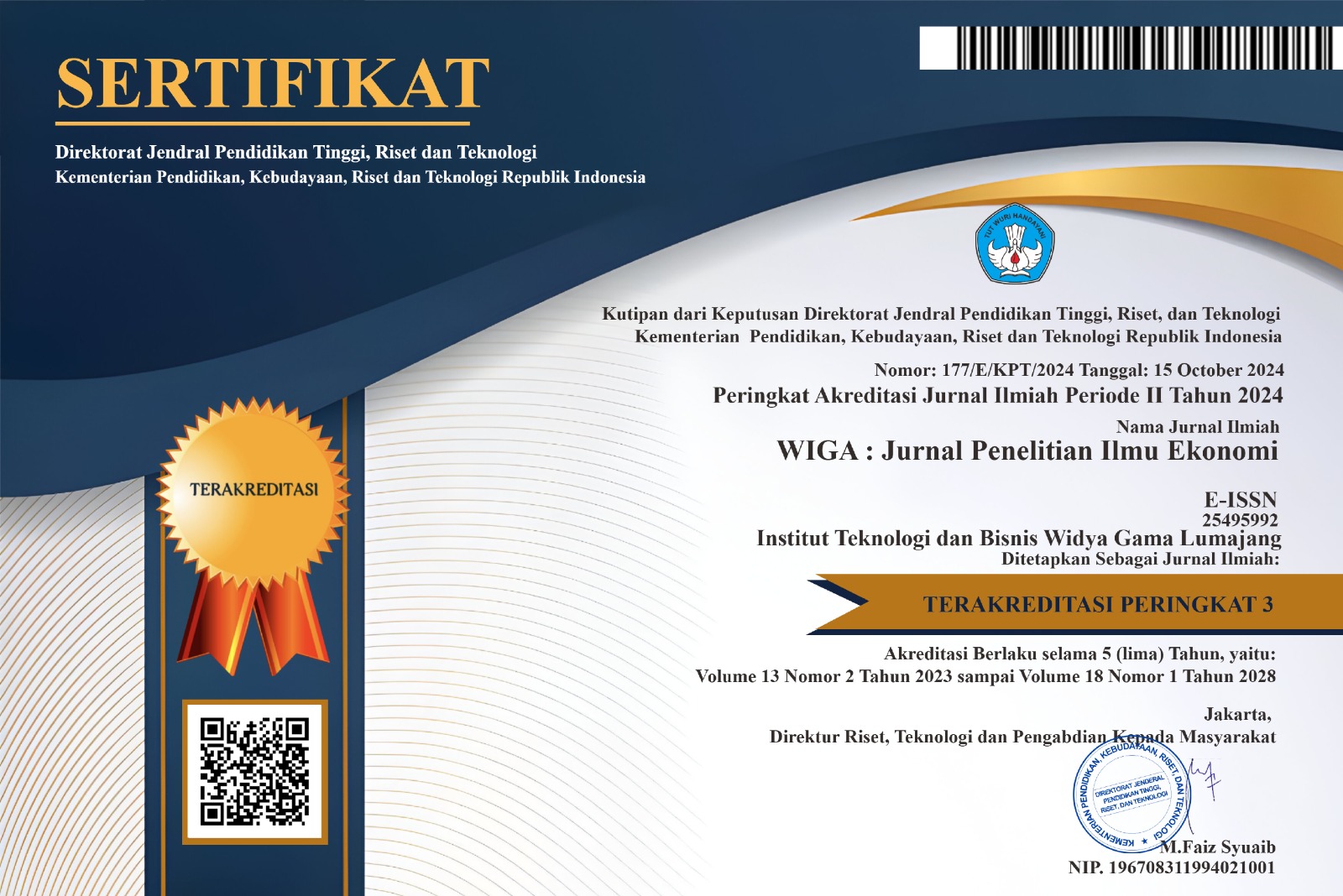Profitability as a Moderator in the Implementation of Environmental Management Accounting for Corporate Sustainability
DOI:
https://doi.org/10.30741/wiga.v13i2.1113Keywords:
Corporate Sustainability, Environmental Management Accountin, ProfitabilityAbstract
This study aims to examine the effect of implementing environmental management accounting on corporate sustainability moderated by company profitability in mining and manufacturing companies listed on the Indonesia Stock Exchange from 2019-2022. Environmental management accounting is measured by eco-efficiency, and company sustainability is measured by GRI standards using content analysis with a scoring approach in assessing environmental and social achievements. Profitability is measured by return on equity (ROE). This research uses a panel data method with a fixed effect model approach. The sampling technique was purposive sampling with the criteria of companies that publish annual reports, and disclose sustainability reporting successively during the 2019-2022 period so that a total of 33 companies were obtained. The research results show that there is a positive influence on the application of environmental management accounting on corporate sustainability strengthened by profitability as a moderator. The application of environmental management accounting can increase its influence on corporate sustainability when the company's profitability is high. This condition is expected to have an impact on achieving corporate sustainability by fulfilling economic, environmental, and social aspects by the triple bottom line concept as a pillar that can create a sustainable business.
Downloads
References
Alareeni, B. A., & Hamdan, A. (2020). ESG impact on performance of US S&P 500-listed firms. Corporate Governance (Bingley), 20(7), 1409–1428. https://doi.org/10.1108/CG-06-2020-0258
Arowoshegbe, A., Emmanuel, U., & Gina, A. (2018). Sustainability And Triple Bottom Line: An Overview Of Two Interrelated Concepts.
Caiado, R. G. G., de Freitas Dias, R., Mattos, L. V., Quelhas, O. L. G., & Leal Filho, W. (2017). Towards sustainable development through the perspective of eco-efficiency - A systematic literature review. Journal of Cleaner Production, 165, 890–904. https://doi.org/10.1016/j.jclepro.2017.07.166
Castro, P., Gutiérrez-López, C., Tascón, M. T., & Castaño, F. J. (2021). The impact of environmental performance on stock prices in the green and innovative context. Journal of Cleaner Production, 320. https://doi.org/10.1016/j.jclepro.2021.128868
Denisia Komalasari, N. K. P. (2017). Peran Profitabilitas Dalam Memoderasi Pengaruh Corporate Social Responsibility Terhadap Nilai Perusahaan Denisia Komalasari ; Ni Ketut Purnawati Email : madepurnawati61@gmail.com. 27–28.
Dewi, R., & Rahmianingsih, A. (2020). Meningkatkan Nilai Perusahaan Melalui Green Innovation Dan Eco-Effisiensi. Ekspansi: Jurnal Ekonomi, Keuangan, Perbankan Dan Akuntansi, 12(2), 225–243. https://doi.org/10.35313/ekspansi.v12i2.2241
Elkington, J. (2017). Towards the sustainable corporation: Win-win-win business strategies for sustainable development. Corporate Environmental Responsibility, June, 109–119.
Ertur, C., & Musolesi, A. (2016). Weak and Strong Cross-Sectional Dependence: A Panel Data Analysis of International Technology Diffusion: WEAK AND STRONG CROSS-SECTIONAL DEPENDENCE. Journal of Applied Econometrics, 32. https://doi.org/10.1002/jae.2538
Fitriani, M., & Purnamasari, P. E. (2023). Peran Profitabilitas dalam Memoderasi Kinerja Lingkungan , Islamic Social Reporting dan Ukuran Dewan Komisaris Terhadap Nilai Perusahaan. SYARIKAT : Jurnal Rumpun Ekonomi Syariah, 6, 49–62.
Hutman falih Chichan, Hussein kareem mohammed, & Tariq Tawfeeq Yousif Alabdullah. (2021). Does Environmental Management Accounting Matter in Promoting Sustainable Development? A study in Iraq. Journal of Accounting Science, 5(2), 114–126. https://doi.org/10.21070/jas.v5i2.1543
Kraus, S., Burtscher, J., Vallaster, C., & Angerer, M. (2018). Sustainable entrepreneurship orientation: A reflection on status-quo research on factors facilitating responsible managerial practices. Sustainability (Switzerland), 10(2). https://doi.org/10.3390/su10020444
Kuncoro, M. (2011). Metode Kuantitatif : Teori dan Aplikasi untuk Bisnis & Ekonomi. UPP STIM YKPN.
Laosirihongthong, T., Adebanjo, D., & Choon Tan, K. (2013). Green supply chain management practices and performance. Industrial Management & Data Systems, 113(8), 1088–1109. https://doi.org/10.1108/IMDS-04-2013-0164
Mardiana, I. A., & Wuryani, E. (2019). Pengaruh Kinerja Lingkungan terhadap Nilai Perusahaan dengan Profitabilitas sebagai Variabel Pemoderasi. Jurnal Akuntansi Unesa, 8(1), 1–8. http://jurnalmahasiswa.unesa.ac.id/index.php/jurnal-akuntansi/
Nandita, D. A., Alamsyah, L. B., Jati, E. P., & Widodo, E. (2019). Regresi Data Panel untuk Mengetahui Faktor-Faktor yang Mempengaruhi PDRB di Provinsi DIY Tahun 2011-2015. Indonesian Journal of Applied Statistics, 2(1), 42. https://doi.org/10.13057/ijas.v2i1.28950
Nikolaou, I. E., & Matrakoukas, S. I. (2016). A framework to measure eco-efficiency performance of firms through EMAS reports. Sustainable Production and Consumption, 8, 32–44. https://doi.org/https://doi.org/10.1016/j.spc.2016.06.003
Osazuwa, N. P., & Che-Ahmad, A. (2016). The moderating effect of profitability and leverage on the relationship between eco-efficiency and firm value in publicly traded Malaysian firms. Social Responsibility Journal, 12(2), 295–306. https://doi.org/10.1108/SRJ-03-2015-0034
Pai, J. Te, Hu, D., & Liao, W. W. (2018). Research on eco-efficiency of industrial parks in Taiwan. Energy Procedia, 152, 691–697. https://doi.org/10.1016/j.egypro.2018.09.232
Paulraj, A. (2011). Understanding the relationships between internal resources and capabilities, sustainable supply management and organizational sustainability. Journal of Supply Chain Management, 47(1), 19–37. https://doi.org/10.1111/j.1745-493X.2010.03212.x
Pradnyani, I. G. A. A., & Sisdyani, E. A. (2015). Pengaruh Ukuran Perusahaan, Profitabilitas, Leverage, dan Ukuran Dewan Komisaris pada Pengungkapan Tanggung Jawab Sosial Perusahaan. E-Jurnal Akuntansi, 11(2), 384–397.
Pratiwi, Y. N., Meutia, I., & Syamsurijal, S. (2020). The Effect of Environmental Management Accounting on Corporate Sustainability. Binus Business Review, 11(1), 43–49. https://doi.org/10.21512/bbr.v11i1.6028
Sari, R. A. (2012). Pengaruh Karakteristik Perusahaan Terhadap Corporate Social Responsibility Disclosure Pada Perusahaan Manufaktur Yang Terdaftar Di Bursa Efek Indonesia. Nominal, Barometer Riset Akuntansi Dan Manajemen, 1(2). https://doi.org/10.21831/nominal.v1i2.1002
Schaltegger, S., Hörisch, J., & Freeman, R. E. (2019). Business cases for sustainability: A stakeholder theory perspective. Organization and Environment, 32(3), 191–212. https://doi.org/10.1177/1086026617722882
Srihardianti, M., Mustafid, M., & Prahutama, A. (2016). Metode regresi data panel untuk peramalan konsumsi energi di indonesia. Jurnal Gaussian, 5(3), 475–485.
Sudana, I. M. (2015). Teori dan Praktik Manajemen Keuangan Perusahaan ((N. I. Sal). Erlangga.
Sugiyono. (2017). Metode Penelitian Kuantitatif, Kualitatif dan R&D. Alfabeta, CV.
Sze, N., & Brocke, J. vom. (2017). What can we learn from corporate sustainability reporting ? Deriving propositions for research and practice from over 9 , 500 corporate sustainability reports published between 1999 and 2015 using topic modelling technique. PLoS ONE, 1–27.
Tanc, A., & Gökoğlan, K. (2015). The Impact of Environmental Accounting on Strategic Management Accounting: A Research on Manufacturing Companies. International Journal of Economics and Financial Issues, 5, 566–573.
Tomšič, N., Bojnec, Š., & Simčič, B. (2015). Corporate sustainability and economic performance in small and medium sized enterprises. Journal of Cleaner Production, 108, 603–612. https://doi.org/10.1016/j.jclepro.2015.08.106
Zhu, Q., Sarkis, J., & Lai, K. hung. (2013). Institutional-based antecedents and performance outcomes of internal and external green supply chain management practices. Journal of Purchasing and Supply Management, 19(2), 106–117. https://doi.org/10.1016/j.pursup.2012.12.001
Downloads
Published
How to Cite
Issue
Section
License
Copyright (c) 2023 Ria Meilan, Een Yualika Ekmarinda, Ikhwanul Hakim

This work is licensed under a Creative Commons Attribution-NonCommercial 4.0 International License.










